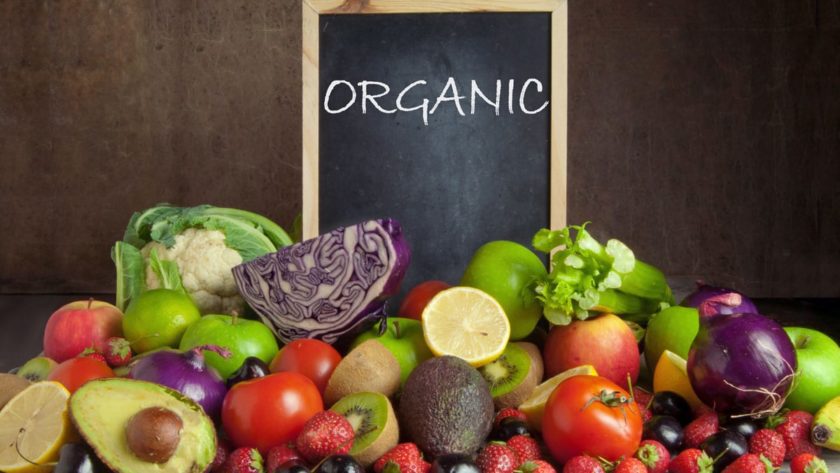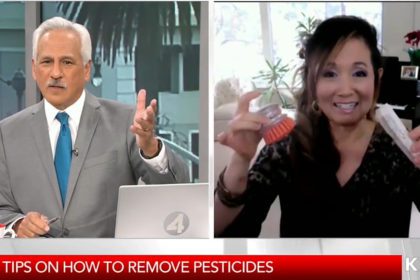
UPDATE: Fresh fruits and vegetables are excellent sources of antioxidants, vitamins, minerals, and fiber and a special treat at any time of year. However, fruits consistently top the list of produce that are most contaminated by pesticides.
Buying pesticide-free produce is the best choice, but they’re generally more costly or may be unavailable. Knowing when it’s smart to buy organic and when to go conventional, you’ll save yourself some extra money.
The Organic Marketplace
The world organic food market has increased at a rate of 20% per year since the early 1990’s making organic food more available and less expensive to consumers. But growing produce without pesticides takes more time and money.
Pesticide Toxicity
A growing number of scientists are in agreement that the chemical pesticides designed to kill insects and fungi on fruits and vegetables can have lasting effects on your health. Even small doses can damage living cells and are linked to toxic effects.
Can You Peel or Wash Off Pesticides?

Washing can reduce pesticide residues but cannot completely eliminate them. Peeling may help, but it removes the valuable nutrients and fiber in the skin. Always clean your produce before eating, cutting, or cooking to remove soil particles and possible bacteria, viruses, or parasites.
To thoroughly wash produce:
- Rinse them in clean cold running water.
- Scrub gently with a natural bristle vegetable brush.
- Rinse well.
- Do not leave them soaking in water. Fruits and vegetables contain water-soluble vitamins. That is, soaking dissolves valuable nutrients that end up in your drain instead of in you.
- Dry with a clean cloth or paper towel to help reduce bacteria that may still be present.
Fruit and Veggie Washes – Are they Effective?
Save your money. The use of produce treatments/rinses has not been proven to be more effective that clean cold running water or distilled white vinegar. The FDA advises against the use of these products since their safety and effectiveness have not been tested or standardized. See Guide to Washing Fresh Produce (Colorado State University).
When to Buy Organic

The Environmental Working Group (EWG) evaluated 50 different types of produce ranking them by their pesticide load. Some fruits and vegetables are more heavily sprayed than others. If cost is an issue, consider buying organic when shopping for the most pesticide-contaminated fruits and vegetables. See the complete list: EWG’s Shopper’s Guide to Pesticides in Produce.
The following are known as EWG’s currently ranked “Dirty Dozen (2019)”. Strawberries were tested to be the most contaminated produce followed by apples and nectarines.
- Strawberries (WORST)
- Spinach
- Kale
- Nectarines
- Apples
- Grapes
- Peaches
- Cherries
- Pears
- Tomatoes
- Celery
- Potatoes
- Hot peppers (EWG’s Dirty Dozen Plus)
When to Buy Conventional

When buying less expensive conventionally-farmed produce, shop for the least contaminated fruits and vegetables known as EWG’s “Clean Fifteen (2019)”:
- Avocados (BEST)
- Sweet corn*
- Pineapples
- Sweet peas, (frozen)
- Onions
- Papayas*
- Eggplant
- Asparagus
- Kiwi
- Cabbage
- Cauliflower
- Cantaloupe
- Broccoli
- Mushrooms
- Honeydew melon
*Per the EWG: A small amount of sweet corn, papaya and summer squash sold in the U.S. is produced from genetically engineered (GE) feedstock. If you want to avoid GE produce, buy organic varieties of these crops.
![]() Karen’s Fit Tip: Maximize living well while minimizing the cost. If possible, shop at your neighborhood Farmers’ Market where produce is freshly picked (most nutritious) and you can ask local growers how their fruits and vegetables are farmed. Eat a diet that includes a wide variety of fruits and vegetables and clean all produce thoroughly.
Karen’s Fit Tip: Maximize living well while minimizing the cost. If possible, shop at your neighborhood Farmers’ Market where produce is freshly picked (most nutritious) and you can ask local growers how their fruits and vegetables are farmed. Eat a diet that includes a wide variety of fruits and vegetables and clean all produce thoroughly.



Thank you Karen!
Thank you, Jim Beam Sent from my iPad
>
Hi Jim… It’s always nice to hear from you! Thank you for checking in. 🙂 ~ Karen
I try to shop only organic products! They are definitely the best choice! Thanks for the post! I really enjoyed reading it! Greets, Morden Park Carpet Cleaners Ltd.
[…] they are the most contaminated of over 48 fruits and vegetables tested for pesticide residue. See When Organic Produce Pays Off. NOTE: If you’re diabetic and watching your carbohydrate intake, this fruit spread contains […]
[…] 2 tablespoons organic white balsamic vinegar (Balsamic vinegar is made from grapes, so be sure it is organic since grapes have been tested to be highly contaminated with pesticides. See EWG’s “Dirty Dozen” list.) […]